Iran Gold Market In Severe Recession
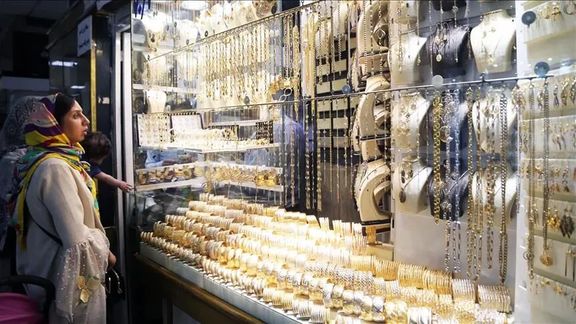
The head of Tehran's Gold, Jewelry, Silver, and Coin Union voiced alarm about Iran's current economic hurdles and the significant impact on gold demand.

The head of Tehran's Gold, Jewelry, Silver, and Coin Union voiced alarm about Iran's current economic hurdles and the significant impact on gold demand.
Nader Bazarafshan on Sunday revealed a serious decline in the demand for gold purchases, citing a decrease of 20-40%. He claims this recession in the gold market is even more severe than the challenges encountered during the peak of the COVID-19 pandemic.
While dismissing rumors of substandard gold entering the market, Bazarafshan has proposed a strategy to address the dwindling demand, recommending the consideration of gold with a karat value lower than 18, a move aimed at enhancing demand by adjusting prices in response to the prevailing decrease in people's purchasing power. However, the proposal has yet to gain official approval.
Gold has traditionally held a significant role in the financial landscape of Iranians, serving as a means of safeguarding assets against economic volatility. The recent economic fluctuations and downturns have further underscored the importance of gold jewelry as a secure investment avenue for the population.
This dire situation was previously echoed by Yuosef Taqizadegan, the head of the Mashhad Gold, Jewelry, and Silver Union, who highlighted the economic struggles faced by young couples. Taqizadegan revealed that the soaring price of gold, which has surged by 100% compared to the previous year, has prompted a shift towards purchasing silver rings, as many newlyweds find themselves unable to afford gold rings.
The World Gold Council, in a recent report, affirmed the decline in gold jewelry purchases within Iran. The report stated that during the first quarter of this year, gold jewelry sales experienced a 15% drop compared to the same period in the previous year.
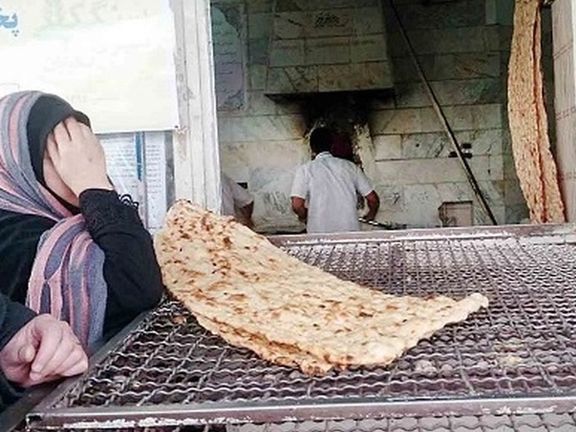
Alarming reports reveal that the cost of bread has surged in more than 15 provinces across Iran with calls for immediate support.
Lawmaker Salman Es’haghi urged action from the regime. He warned: "Denial by some politicians notwithstanding, the reality is stark. Bread prices have increased by over 40% in more than 15 provinces. This has sparked significant public dismay and concern."
Es’haghi also voiced concerns over potential shortages of essential commodities. "The scarcity of [baby] formula [milk] has already escalated into a crisis in certain provinces. Moreover, if negligence persists in managing the supply of medicines, we could confront shortages during autumn and winter."
The Mehr News Agency has now raised concerns about possible bread price increases in other regions, including the capital, Tehran, as early as mid-August.
Approximately ten days ago, Ahmed Keshtgar, Head of the Mashhad Bakers Union, announced a 40% bread price increase in Khorasan Razavi province, with plans for a gradual nationwide implementation. Meanwhile, Interior Minister Ahmed Vahidi last week downplayed the bread price surge as mere speculation.
A shift in policy regarding bread pricing occurred when Mohammad Jalal, the Director of the Flour and Bread Subsidy Smart Plan, announced in early July that the decision on bread prices would be devolved to provincial authorities.
Amidst these developments, Jahan Sanat newspaper reported that some service providers, including bus drivers, have leveraged the pretext of bread price increases to raise their service rates in specific areas of Tehran.
The crisis is worrying the regime as the anniversary of the death in morality policy custody of Mahsa Amini draws near and tensions across Iran are already rising.
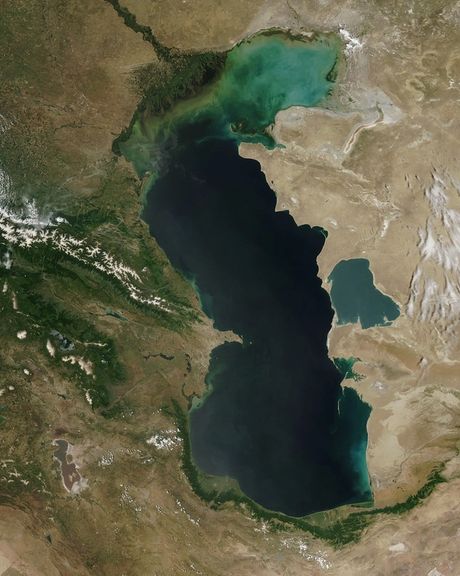
Iran has blamed Russia for the diminishing water levels in the Caspian Sea which threatens to damage delicate ecosystems that rely on the sea's waters.
The head of the Iranian Department of Environment, Ali Salajegheh, claimed the closure of vital entrances to the Caspian Sea are a major factor behind the crisis, particularly emphasizing the impact of the closure of the Volga River.
Salajegheh expressed his concerns, stating, "The entrances to the Caspian Sea have been closed by the neighboring countries, especially the entrance from the Volga River has been shut. This has led to a significant decrease in the sea's water levels, which poses a serious ecological challenge."
The Iranian official further elaborated on the extent of the problem, asserting, "The Caspian Sea's water level has been steadily decreasing, and alarming statistics indicate a reduction of approximately one meter over the last 4-5 years. On average, the sea is receding by 20 centimeters annually."
However, he did not discuss the impact of increasing temperatures and climate change in worsening the crisis. Highlighting the urgency of the situation, he urged for collaborative efforts among the neighboring countries to address the issue.
It was an unusual attack from Iran considering the two sanctioned nations have become closer allies since the war in Ukraine, in which Iran has supplied drones and other military support to Russia. As Iran remains largely isolated on the world stage, it has become closer to Russia in economic dealings in addition to supporting it in military aspects.
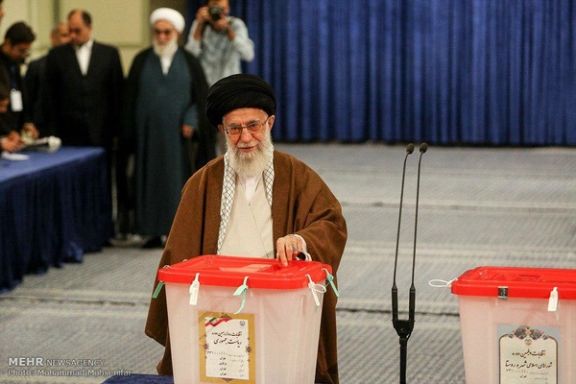
Tens of public figures in Iran have expressed concern in a statement that the upcoming parliamentary elections have been taken hostage by hardliners and security organs.
The statement released Sunday addressed the Iranian nation as "the true owners of this country and its government," and maintained that "the rulers have no special privilege other thanrepresenting and serving the people."
The statement has been posted on Telegram messaging app in an account that belongs to Saham News, a media outlet that represented reformist figure Mehdi Karrubi, a former parliamentary speaker and presidential candidate.
The political activists, writers and civil rights defenders stated that the elections in Iran have been hostage to the "arbitrary supervision" of the Guardian Council, a body that operates under the direct supervision of Supreme Leader Ali Khamenei and vets the candidates based on their loyalty to him.
They also complained about the intervention of security and intelligence organizations in the election process. According to the statement, the worst examples took place in the 2020 parliamentary elections and the presidential election in 2021 which brought Ebrahim Raisi to power and packed the parliament with hardliners.
The activists also charged that the Assembly of Experts whose members are chosen based on the same kind of vetting by the Guardian Council lacks the independence and capability to supervise the Supreme Leader's performance, as the constitution requires.
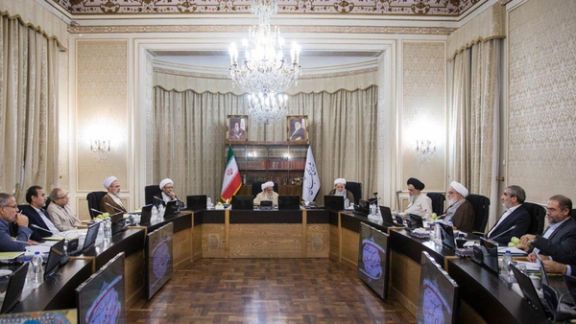
"The Islamic Republic is overwhelmed by a crisis which is the outcome of distancing itself from the ideals of a republic and democracy and its submission to despotism and dictatorship. During the past 44 years, this has led to multiple political, economic and cultural crises as well as leading to poverty, corruption, repression, violations of the citizens' legitimate rights and freedoms," the statement added.
The activists further said: "As a result of this situation, young Iranians have lost their hope in any improvement in this dreadful situation and see only two options before them: Leave the country or continue living in Iran without dignity under the pressure of humiliation."
In another part of the statement, the signatories pointed out that the Islamic Republic has made hijab enforcement a security issue and by doing so has made the situation even more complicated for women who under the pressure feel further humiliated.
But what was even more notable in the statement was a demand to change the regime’s anti-West foreign policy.
"The country's independence has been seriously weakened as a result of a foreign policy devoid of dignity and prudence. This situation has made Iran's foreign policy a playground for Russia's aggressive policies," the statement said, adding that "The Islamic Republic's foreign policy has undermined Iran's national interests and disrupted the balance in its relations with East and West and made the country's progress and development hostage to seriously damaging sanctions."
The activists further pointed out that as a result of this policy despite its anti-imperialistic slogans, the regime has submitted to the humiliating oil for food arrangements and barter trade with underprivileged countries to provide food and medicine.
The signatories to the statement declared that "In such a catastrophic situation that has forced a large part of Iranians and their elites to leave the country for good, holding an election is nothing more than beautifying the regime in a bid to lend it some legitimacy. "We do not believe that such an election is going to lead to any improvement in governance," they insisted.
"What can justify people's participation in the upcoming election in March, is the regime's return to democracy by listening to the people and their elites and bringing about structural reforms in the country. A decision to hold a referendum to change the Constitution is a requirement for that change. Without doing this participation in the election would be a deceit against the country's national interests," the statement concluded.
Centrist politician Faezeh Hashemi, former state TV Chief Mohammad Sarafraz, 1980s militant journalist Isa Saharkhiz, and several cultural figures such as poet Ali Babachahi are among the signatories of the statement.
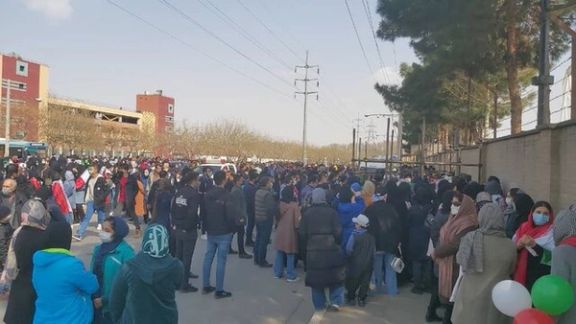
FIFA and the Asian Football Confederation issued warnings regarding Iran's ban on women's attendance at football stadiums, issuing consequences for non-compliance.
FIFA has been engaged in persistent efforts for nearly a decade to persuade Iranian authorities to rescind the unwritten restriction and enable women to witness male players' matches.
While some limited exceptions were made in recent years, the ban was reintroduced in March 2022, despite FIFA's insistence on unrestricted access for women.
Coming at a time when the world has their eyes on the women's world cup championships, the latest warnings have prompted swift action from Iranian sports authorities, resulting not only in granting permission for women to attend matches at the Azadi Stadium in Tehran but also facilitating access for women to stadiums across the country for football matches, according to Shargh daily.
The regime has, on occasion, allowed a token number of women to attend matches, seemingly as a symbolic gesture to demonstrate compliance with FIFA's recommendations, but it is a policy which has been in place for over four decades.
The Islamic Republic has for decades enforced a policy barring women from entering football stadiums, purportedly citing concerns about the suitability of the atmosphere due to profane language from male fans. This discriminatory measure has led to numerous instances of arrests, beatings, detentions, and abuses against women who have challenged the prohibition.

The giant German engineering firm Bosch reportedly aided Iran’s security forces in facial recognition technology in 2017 and delivered thousands of street cameras.
The German television outlet ARD on Sunday aired a blockbuster report titled “Iran: Persecution with modern surveillance technology,” citing a document obtained by the outlet in Persian showing that at “Khatam University in Tehran in 2017, an instruction course was organized by Bosch security and an Iranian distribution partner.” The topics of the instruction course were “facial recognition, face detection, and intelligent tracking from objects.”
The instruction teacher was allegedly a distribution director for the Bosch’s Middle East division. ARD did not name the director. Iran International sent press queries to Bosch, including the spokesperson responsible for the Middle East.
Bosch told ARD it delivered 8,000 cameras to Iran’s regime between 2016-2018. Bosch disputed that its cameras can be used for full facial recognition and denied that a Bosch employee participated in the instruction course. According to Amnesty International, the regime is expanding its” mass surveillance” targeting street traffic, with a focus on women to ensure they are wearing their compulsory hijab.
Iranian dissidents, whose images were altered to protect their identities, told ARD they seek to sabotage the cameras on the streets to prevent the persecution of protesters. ARD showed images of Bosch cameras and software used to monitor streets and highways.
An Iranian activist told ARD when a camera captures more than5 or 10 people at a protest an alarm signal is sent to the police and “within minutes” security forces are present.
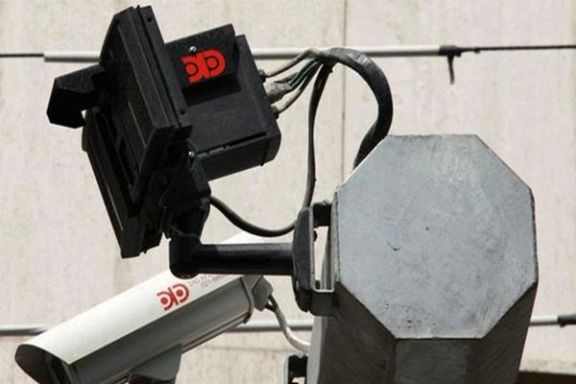
In April, Iran International reported that Ahmad-Reza Radan, the chief commander of the Iran’s police, said that his security apparatus will use advanced technology and equipment to identify women who violate the law requiring females to wear the mandatory hijab in public places. He said women and girls who do not cover their hair in “public places, cars, or commercial centers,” will be prosecuted.
The ARD concluded its report with the narrator stating “When women in Iran face a trial in the future it could take place with help of technology from Made in Germany.”
It is not clear if Bosch has had any dealings with Iran since the United States re-imposed sanctions on the Islamic Republic in 2018, but Tehran is adept at finding intermediary's to do business with Western companies.
The Iranian-American human rights activist, Lawdan Bazargan, told Iran International “Regrettably, Germany has a long-standing history of supporting the Islamic Regime of Iran (IRI) at the expense of the Iranian people, human rights, and democratic values. The 1980s, known as the Bloody Decade among Iranians, witnessed Germany maintaining close ties with Iran while remaining silent after the 1988 massacre of political prisoners. “
She said “Taking into account Germany's past experiences and the potential consequences of aiding the IRI in oppressing its people, it appears that Germany's assistance to the IRI is indeed deliberate.”
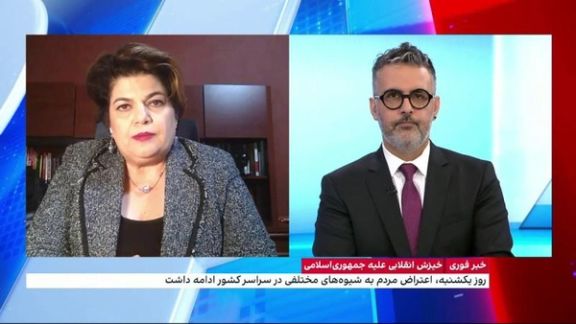
Bazargan, who runs the NGO Alliance Against Islamic Regime of Iran Apologists (AAIRIA), added, “In the mid-2000s Nokia Siemens Network (NSN) went a step further, selling an electronic monitoring and surveillance center to Iran's state-owned telephone company, bolstering this oppressive regime. The system allowed the Iranian government to easily spy on and intercept communications of dissidents heavily reliant on web-based platforms to connect with the outside world. Tragically, the IRI exploited this technology to apprehend protesters during the 2009 Green Movement, subjecting them to horrifying torture and unjust imprisonment based on their chats and text messages.”
Jason Brodsky, policy director for the US-based United Against Nuclear Iran (UANI), told Iran International that the ADR report “is deeply disturbing. It demonstrates the long standing ties between the German business community and the Islamic Republic. And underscores the need for enhanced due diligence of German companies world-wide. Iranian drones are being found with western components.
Brodsky continued “And if Bosch is, wittingly or unwittingly, involved in facial recognition and surveillance technology, then this calls for a robust investigation by Bosch and the German authorities as to what has been done here. Bosch has been a partner in the past with the Islamic Republic.” He added the “German government like to say it is committed to upholding human rights, but German businesses are involved in Iranian markets. The German government has to speak with one voice with the business community. “

Brodsky said that “Bosch was part of a German business delegation visiting Iran in 2016 after the JCPOA. The German government has to be cognizant of it that Iran extracts western technology to advance its repression apparatus at home.”
The JCPOA is an abbreviation for the Joint Comprehensive Plan of Action—the formal name of the Iran nuclear deal reached in 2015.
The Bosch corporation played a key industrial role in advancing the war aims of Nazi Germany. Bosch used an estimated 20,000 slaves, which included 1,200 concentration camp inmates, as part of its efforts to help Hitler win the war.
Rabbi Abraham Cooper, the associate dean of the LA-based Simon Wiesenthal Center (named after the legendary Nazi hunter Simon Wiesenthal), told Iran International that “Facial recognition is weaponized by the Iranian regime against women and girls and facial recognition is being facilitated by one of Germany’s legacy companies. Shame on them. And shame on the German government for not putting an end to it. The German government can put an end to it in one second by barring export licenses. “
Cooper asked “Where are the voices of the political parties and NGOs who speak up, first and foremost, for the rights of women?” He warned that the Bosch technology will damage the “Women, Life, Freedom” movement.” He added "How many more people will end up in prison tortured and raped by virtue of this technology?”
Cooper noted the implications of Bosch having “not learned or forgotten” the lessons from the Holocaust due to the principle of “export über alles.” The prominent Rabbi said that by “putting on willful blinders so that businesses can maximize profits will come at a pernicious price with dealing with a murderous Iranian regime that threatens all of us.”
Iran International sent press queries to German Chancellor Olaf Scholz’s spokesman, Steffen Hebestreit, and to Sebastian Fischer, the spokesman for German Foreign Minister, Annalena Baerbock.
Baerbock claims to have a “feminist foreign policy” but is facing criticism for allegedly allowing Iran’s“hanging judge” Hossein-Ali Nayerit o enter Germany for medical care.
Gazelle Sharmahd, the daughter of German businessman Jamshid Sharmahd, who was sentenced to death in Iran in February, has told the German media that Scholz and Baerbock are not doing enough to secure her father’s freedom.
Bazargan said “Instead of bolstering the IRI, Germany should take a firm stance and sever all ties with Iran, demanding the immediate release of Jamshid Sharmahd, the German citizen held hostage by the Islamic Regime. By doing so, Germany can demonstrate its commitment to human rights and support the aspirations of Iranians striving for freedom and justice.”
According to statistics from the Federal Statistical Office of Germany, Germany exported more than $1.2 billion in merchandise to Iran from January to October 2022.
Traditionally, Germany has been viewed as the weakest Western link in the effort to improve human rights in Iran and end the theocratic state’s reported nuclear weapons program. Iran International reported last week about the controversial twin city partnership between the German city of Freiburg and Esfahan.